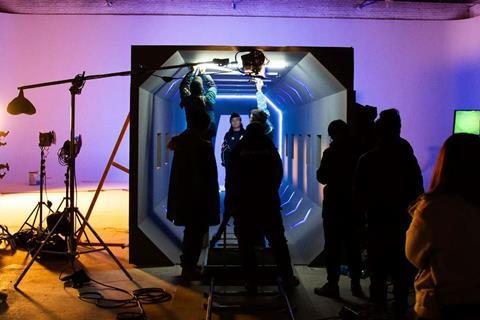
When Marcus Ryder took over as CEO of The Film and TV Charity in 2023, he noticed a fridge magnet in the office emblazoned with a quote from Nobel prize winning South African bishop Desmond Tutu: ‘There comes a point where we need to just stop pulling people out of the river. We need to go upstream and find out why they’re falling in.’
These words can certainly be applied to the issue of mental health in the UK film and TV industries. In 2019, Ryder’s predecessor Alex Pumfrey launched the Looking Glass survey, research into the mental wellbeing of the UK film and TV workforce. The results revealed the statistic that 87% of those working in the sector had experienced mental health problems.
Since then, industry leaders have been trying to ‘go upstream’ (in Tutu’s parlance) to try and understand the issue. There has been further research - the Looking Glass surveys are now published every two years - and programmes are being put in place to improve the working environment by organisations including the Film and TV Charity, 6FT From The Spotlight and Solas Mind.
As Ryder points out, mental health issues are not directly related to the boom-and-bust nature of production and can occur at any time. Yet, for freelancers dealing with Covid, the post-pandemic production bonanza and the sudden slowdown during the Hollywood strikes, these have been especially turbulent times. The extent of this problem, especially amongst workers from underrepresented background, was highlighted in June’s The Loneliness In The Film And TV Industry Report, published by the Film and TV Charity in collaboration with The Centre For Loneliness Studies at Sheffield Hallam University.
“We all know we have issues around bullying, discrimination and poor management behaviour,” says Ryder. “Often, these aren’t addressed because people think they can tolerate them for the duration of the production.”
Another issue facing freelancers is financial stress. The Film and TV Charity’s 2023 Money Matters report revealed that 45% of industry workers were struggling financially; the next report is due out later this year.
In response, the Film and TV Charity has pioneered its own Whole Picture Toolkit for embedding mentally healthy working practices early on in a production. On productions following the Toolkit recommendations, the metrics for mental health are already “significantly better.”
“People who have a mental health issue will find support within the industry,” observes Matt Longley, co-director and founder of 6FT From The Spotlight, who highlights the fact that little support was available when he set up the nonprofit organization in 2017. “A few of us got together and said we need to do something to change the way the industry works.”
Now, 6FT, which provides wellbeing facilitators on sets as well as consultancy and training programmes, is trying hard to work at the “front end” of productions, to identify in advance any problems which may arise. “Just having a counsellor there is not necessarily going to change anything,” he adds. “It’s changing the way the industry works that will give the long-term benefit and actually make it more sustainable and stay in it longer.”
“There is still no defined minimum standard for mental health best practice across production’ says Anna Mishcon, head of programme delivery at the Film and TV Charity’s new Mentally Health Productions unit. That’s why she and unit co-founder Andy Glynne, head of programme development, have formed a working group of 35-plus organisations, including the British Film Commission along with broadcasters, studios, streamers, commissioning organisations and other industry bodies, to design an industry set of standards. These are expected to be launched later this year – and already have backing from the studios, streamers and broadcasters.
The Film and TV Charity also aims to ensure that students and new entrants to the industry are fully aware of best practice when it comes to mental health. “We would like to see a world where students are leaving tertiary education and have a greater awareness of the mental health support they can expect when they move into the professional production environment,” says Mishcon. “If we don’t capture that generation, we are missing a vital trick.”
Film and TV workers are themselves becoming more proactive in finding the increased support that is available. Mollie, an assistant director and runner, says that she contacted the Film and TV Charity in 2024, when she hit “rock bottom. I can honestly say their support saved not only my career, but probably my life too. It’s an incredibly difficult industry [and] we all have our part to play to make things safe, more accessible, supportive and kinder.”
Supporting role

Actress and trained psychotherapist Sarah McCaffrey founded her company Solas Mind in 2020, after realising the strains that freelances were under. “The majority of people working in this industry are contractors,” she notes. “They don’t have the benefits you would get in a big corporate company and yet they work incredibly long hours in a creative but stressful environment.”
Solas Mind now has a team of 70 fully qualified coaches and counsellors, and offers a digital platform and a bespoke app for each production. The British Film Commission were able to collaborate with Solas and fund crew counselling sessions for a range of productions, including Black Bag, California Schemin’, Industry, War Of The Worlds and season two of The Pact.
“We can scale up from just offering a really small package of support up to those massive [projects] where a production will have 200 support sessions,” says McCaffrey. “We tailor the support team to suit the content.”
Other new initiatives include mental health training for freelancers and managers and making sure even small productions use an HR consultant, so freelancers have an effective sounding board. Ryder also notes the importance of collating more data around physical well-being. “I’ve worked as a director and exec for over 25 years and I don’t know a camera operator who doesn’t have a bad back. I don’t know a boom operator who doesn’t go to physio.”
Longley, meanwhile, is optimistic that addressing mental health issues will soon become as commonplace for productions as choosing the right camera lenses: something that is completely “routine.”
For McCaffrey, the key to making proper change is to ensure that mental health support becomes a standard part of production planning. “The more we empower people to be compassionate leaders, the better it will be for the industry.”








